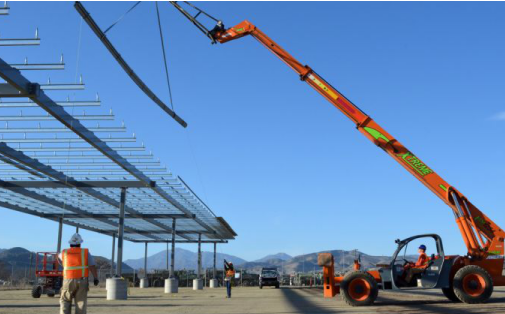中国储能网讯:大多数企业很难拿出前期资金来建立一个微电网,而其融资可能是一个令人头疼的问题。从理论上讲,如果一个拥有无限资本的企业购买项目并以客户的名义代替客户进行操作,以换取服务费,那么这个问题就会迎刃而解。
总部位于华盛顿的私募股权巨头凯雷集团(Carlyle Group)去年秋天成立了一个业务部门实施这样的项目。Dynamic Energy Networks (DEN)将部署凯雷集团投资建设的微电网,然后签署长期合同,以能源即服务的模式运营。

这种模式已经部署在几个实例中,它消除了前期的资金需求,并迎合了希望获得更清洁或更可靠的电力但不想参与能源资产管理业务的客户的需求。
目前为止,还没有哪家公司能够为这种规模的项目提供资金。凯雷集团已经拨出了5亿美元的首笔资金,但是DEN总裁兼首席执行官凯伦•摩根(Karen Morgan)日前表示:“这种投资将不会进行限制。”
这个项目如果获得成功,那么在微电网发展历史上是一件具有意义的大事。大型企业和市政客户希望微电网能够提供的弹性和环境效益,但是没有人保证能够让其具有成本效益。而这个项目是一个认真的尝试。凯雷集团的兴趣可能会促使其他私募股权公司将微电网视为一种投资工具。
DEN公司更像一个股权投资者,而不是一家能源服务公司。这使得它在达成交易方面具有高度的灵活性。DEN公司计划专注于新的架构,主要针对用户侧,但如果有好的机会出现,它可以购买现有资产或修复它们。
而对于刚刚起步的微电网行业来说,一个关键障碍是缺乏可重复性,这将增加成本。而资金规模开拓了企业级微电网建设和其他形式合作的可能性。事实上,企业的管理者不会对小型的一次性产品感兴趣,这一类别包括了迄今为止几乎所有的微电网项目。
凯雷集团拥有约270家投资组合公司,管理着包括能源、基础设施和房地产在内的400亿美元的实际资产。DEN公司可以很容易地满足这个市场的需求。
摩根在谈到与凯雷集团的关系时说:“这是一个明显的差异化优势,而且我们正在充分利用这个优势。”
该组织尚未宣布参与哪个项目,但有几个项目正在进行中。一旦完成了这个项目,DEN公司不仅是一个开发者,而且将会进行大量投资。摩根说,DEN公司将与一些同类最佳的EPC(工程总承包)合作建设项目,并与施耐德电气合作进行微电网控制。该公司是杜克能源公司的微电网即服务模式的早期开拓者。
如果一切按计划进行,DEN公司就像一个独立的发电厂,从其正好位于微电网内的发电机组产生的电能获得回报。
摩根说,这个平台在未来三到五年内将价值30亿到50亿美元。
他表示:“微电网和能源基础设施具有一定的复杂性,特别是在用户侧背后的复杂性,但这对我们来说非常有吸引力,因为可以为此提供相关集成解决方案。这就是我们可以获取更多价值的地方:从资本的角度以及技术和合作的角度来看,我们的执行方式非常高效。”
目前从微电网中获取利润已经被证明是非常困难的。也许初期的参与者当初投入不够大,但当投入几亿美元的时候,再实施这样的项目获利就容易多了。(中国储能网独家编译,转载请注明来源)
原文如下:
Big Money Is Getting Into Microgrids
The Carlyle Group will put hundreds of millions of dollars toward owning and operating microgrids, tackling the industry’s financing challenges.
Julian Spector January 25, 2018
Can big money help standardize microgrid development?
Most companies have a hard time coming up with the upfront cash to build a microgrid, and financing one can be a major headache.
Theoretically, that headache would go away if an entity with functionally unlimited capital bought the project and operated it on behalf of the customer in exchange for service payments.
The Carlyle Group, the Washington, D.C.-based private equity behemoth, set up a business unit last fall to do just that. Dynamic Energy Networks (DEN) will deploy Carlyle capital to create microgrids, then operate them in an energy-as-a-service model for long-term contracts.
This model has been deployed in a few instances already; it eliminates upfront capital requirements and caters to customers that want cleaner or more reliable power but don't want to be in the energy asset management business.
But up until now, nobody has funded the model at this scale. Carlyle has set aside an initial pot of $500 million, but DEN President and CEO Karen Morgan said at DistribuTech Wednesday, "There is no cap on that."
This entrance is a big deal in the hardscrabble world of microgrid development. Large corporate and municipal customers want the resilience and environmental benefits that microgrids can provide, but nobody's cracked the code on how to make it cost-effective at scale.
No one with this much money has given it a serious try. Carlyle's interest may prompt other private equity firms to consider microgrids as an investment vehicle.
DEN approaches its work more like an equity investor than an energy services company. That gives it a high degree of flexibility in shaping its deals compared to, say, a utility. DEN plans to focus on new builds, primarily behind the meter, but it can buy existing assets or renovate them if a good opportunity arises.
A key hurdle to the fledgling microgrid industry has been lack of repeatability, which drives up costs. The scale of funding here opens up the possibility of enterprise-wide microgrid contracts and other forms of big thinking. Indeed, the leadership won't be interested in small one-offs, a category that describes nearly every microgrid built so far.
"A lot of assets have been sold at the facility level; this is really a C-suite solution," said Morgan, who previously led Renewable Energy Trust Capital, which owned utility-scale wind and solar.
C-suites might be easier to access when the firms involved share the same parent company. Carlyle owns some 270 portfolio companies and manages $40 billion of real assets including energy, infrastructure and real estate. DEN could easily keep itself busy catering to that market.
"It is a clear differentiated advantage, and it's something that we're leveraging significantly," Morgan said of the relationship with Carlyle.
The group hasn't announced any projects yet, but several are in the works.
Once they get finalized, DEN won't be the developer, but it will have input, Morgan said. DEN will work with a handful of best-in-class EPCs to build projects, and has a partnership with Schneider Electric for microgrid controls. That firm was an early pioneer of the microgrid-as-service model in its work with Duke Energy.
If all goes according to plan, DEN would resemble an independent power producer, getting paid for electrons flowing from its fleet of generators, which happen to be located inside microgrids.
That platform will be worth $3 billion to $5 billion in the next three to five years, Morgan said.
"The complexity around microgrids and energy infrastructure, particularly behind the meter, is what is very compelling to us, because there's a lot of value that's created in delivering those integrated solutions," she said. "That's where we can capture more value: We're efficient in how we execute, from a capital perspective as well as technology and partnering perspective."
Extracting profit from microgrids has proven notoriously difficult so far. Perhaps the early entrants just weren't thinking big enough. It's a lot easier to play the long game when you have a few hundred million dollars to spend.





